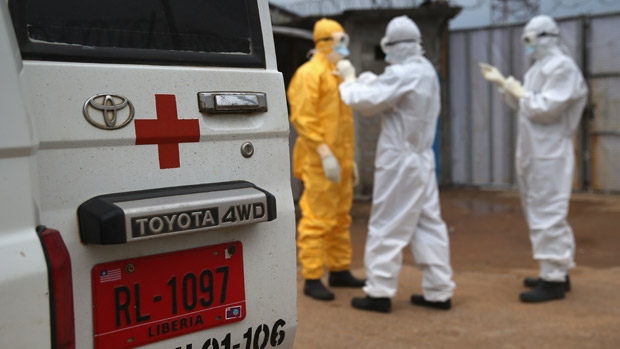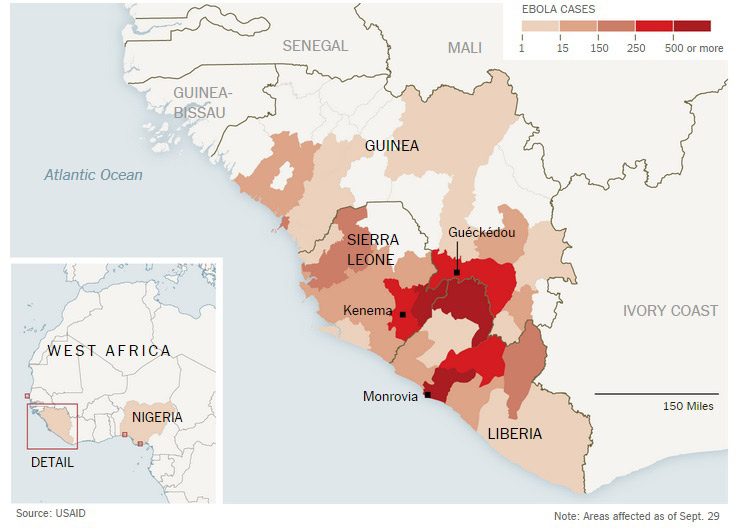Ebola response: who has donated the most?
The UN launches an emergency appeal for funds as China is criticised for its failure to contribute

A free daily email with the biggest news stories of the day – and the best features from TheWeek.com
You are now subscribed
Your newsletter sign-up was successful
The UN secretary-general Ban Ki-moon has launched an urgent appeal to the international community for funds to help fight the Ebola epidemic in West Africa.
Ban called on those countries "who really have capacity" to provide financial and other logistical support, including healthcare workers and medical equipment.
Over 4,500 people in Sierra Leone, Guinea and Liberia have now died from the disease and the international community is being criticised for its failure to respond adequately to the crisis. Health experts argue that the outbreak could have been contained if more assistance had been given months ago.
The Week
Escape your echo chamber. Get the facts behind the news, plus analysis from multiple perspectives.

Sign up for The Week's Free Newsletters
From our morning news briefing to a weekly Good News Newsletter, get the best of The Week delivered directly to your inbox.
From our morning news briefing to a weekly Good News Newsletter, get the best of The Week delivered directly to your inbox.
Kofi Annan has said he is "bitterly disappointed" with the lack of action. "If the crisis had hit some other region it probably would have been handled very differently," former UN secretary-general Kofi Annan told BBC Newsnight.
"In fact when you look at the evolution of the crisis, the international community really woke up when the disease got to America and Europe."
Currently, the US and the World Bank lead the way in international donations, with the UK the fifth largest donor.
Private donors also make up a large proportion of the donations. These include a $50 million pledge from Bill and Melina Gates and a $25 million donation from Facebook founder Mark Zuckerberg.
A free daily email with the biggest news stories of the day – and the best features from TheWeek.com
President Barack Obama has stressed the need for a faster and more robust response to the outbreak, calling on world leaders to pledge more to stop the ongoing humanitarian crisis.
China has faced criticism for the size of its pledge, with many suggesting it should contribute in a way that befits a rising world power.
Cuba, meanwhile has been widely praised for its response to the outbreak. The small island nation has the single biggest medical force on the Ebola frontline in Sierra Leone, The Guardian reports.
Humanitarian pledges | Create Infographics
Ebola outbreak country by country: from Guinea to the US
14 October
The UK has begun screening passengers arriving from West Africa for signs of the Ebola virus, taking passengers' temperatures and asking them questions about their health.
The procedures have been implemented at Heathrow terminal 1 and are expected to be extended to other Heathrow terminals, Gatwick and Eurostar by the end of the week, the BBC reports.
The screenings begin as health secretary Jeremy Hunt warns that a handful of cases of the virus could arrive in the UK by Christmas. Both Spain and the US are already dealing with Ebola infections that took place on their own soil.
Meanwhile, the focus of the international response remains on West Africa, where countries have been battling the Ebola virus outbreak for six months and thousands of people have died.
Liberia
Total cases: 4,076 Total deaths: 2,316
Liberia is by far the worst affected country in this current outbreak, recording more than half of all deaths in West Africa. Having experienced two civil wars in as many decades, the country's crumbling healthcare infrastructure has struggled to cope with the deadly outbreak.
Schools and businesses have closed down and elections have been postponed. There are rumours that schools may not reopen until the start of 2015 or perhaps later. The outbreak is also crippling the country's economy as food shortages abound and prices soar.
However, the country's healthcare workers remain resilient, risking their lives to care for patients and defying calls to strike over lack of protective clothing and hazard pay, Reuters reports. Thousands of US troops are also on the ground working to construct 17 more treatment centres in the country and training hundreds more health care workers.
Sierra Leone
Total cases: 2,950 Total deaths: 930
More than a million people have been placed under indefinite quarantine in an attempt to stop the spread of the virus, meaning that more than one third of the country's population is now unable to move freely.
"The isolation of districts and chiefdoms will definitely pose great difficulty," President Ernest Bai Koroma told the nation in a televised address. "But the lives of everyone and the survival of our country takes precedence over these difficulties."

Guinea
Total cases: 1,350 Total deaths: 778
Despite having originated in Guinea last December, the outbreak has not been as widespread here as it has been in neighbouring Liberia and Sierra Leone – and scientists are unable to explain why. Researchers at the New England Journal of Medicine have traced the disease back to a two-year-old girl who caught the disease from an infected fruit bat. The disease then spread to her family and then across borders to over 8,000 people worldwide.
Total cases: 20 Total deaths: 8
Nigeria, which has now been declared Ebola-free, is viewed as the most remarkable success story of the current outbreak.
When the virus arrived in Lagos, one of the largest megacities in the world, observers feared the worst. However, within months, the virus had been contained through a combination of factors, according to website Mother Jones. Cases were detected early, a co-ordinated response from government healthcare workers was launched and contact tracing was done effectively so infected people were quickly quarantined and treated.
US and Spain
In both countries, a nurse contracted the disease after treating an infected patient in a high-level isolation centre, raising questions about how the transmission occurred.
In both cases, officials have claimed that protocol may have breached, and investigations are now underway. "Something went wrong, and we need to find out why and what," said Dr. Anthony Fauci, director of the US National Institute of Allergy and Infectious Diseases told CNN. Healthcare workers in the US say they are preparing themselves for further cases.
-
 Political cartoons for February 22
Political cartoons for February 22Cartoons Sunday’s political cartoons include Black history month, bloodsuckers, and more
-
 The mystery of flight MH370
The mystery of flight MH370The Explainer In 2014, the passenger plane vanished without trace. Twelve years on, a new operation is under way to find the wreckage of the doomed airliner
-
 5 royally funny cartoons about the former prince Andrew’s arrest
5 royally funny cartoons about the former prince Andrew’s arrestCartoons Artists take on falling from grace, kingly manners, and more
-
 Trump’s fuel blockade puts Cuba in crisis mode
Trump’s fuel blockade puts Cuba in crisis modeIN THE SPOTLIGHT Plummeting tourism, scrambling airlines and rolling blackouts are pushing Cuban society to the brink
-
 Epstein files topple law CEO, roil UK government
Epstein files topple law CEO, roil UK governmentSpeed Read Peter Mandelson, Britain’s former ambassador to the US, is caught up in the scandal
-
 Iran and US prepare to meet after skirmishes
Iran and US prepare to meet after skirmishesSpeed Read The incident comes amid heightened tensions in the Middle East
-
 Israel retrieves final hostage’s body from Gaza
Israel retrieves final hostage’s body from GazaSpeed Read The 24-year-old police officer was killed during the initial Hamas attack
-
 China’s Xi targets top general in growing purge
China’s Xi targets top general in growing purgeSpeed Read Zhang Youxia is being investigated over ‘grave violations’ of the law
-
 Panama and Canada are negotiating over a crucial copper mine
Panama and Canada are negotiating over a crucial copper mineIn the Spotlight Panama is set to make a final decision on the mine this summer
-
 Why Greenland’s natural resources are nearly impossible to mine
Why Greenland’s natural resources are nearly impossible to mineThe Explainer The country’s natural landscape makes the task extremely difficult
-
 Iran cuts internet as protests escalate
Iran cuts internet as protests escalateSpeed Reada Government buildings across the country have been set on fire